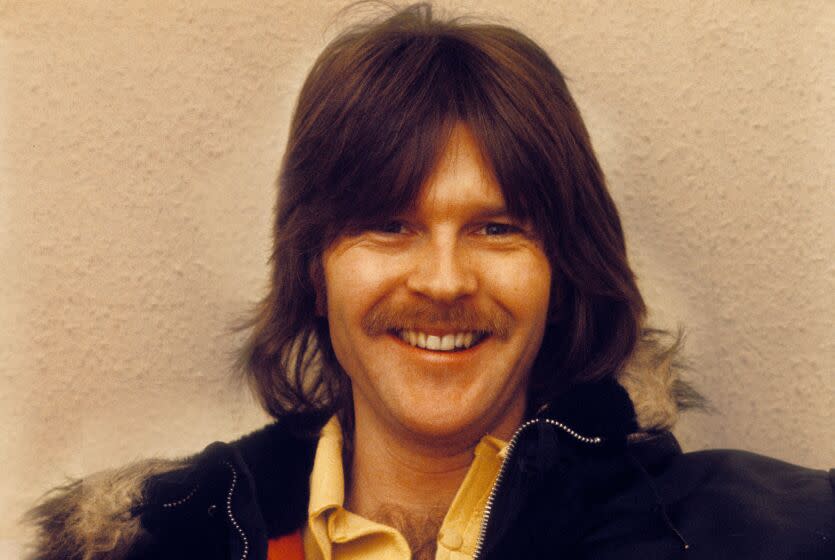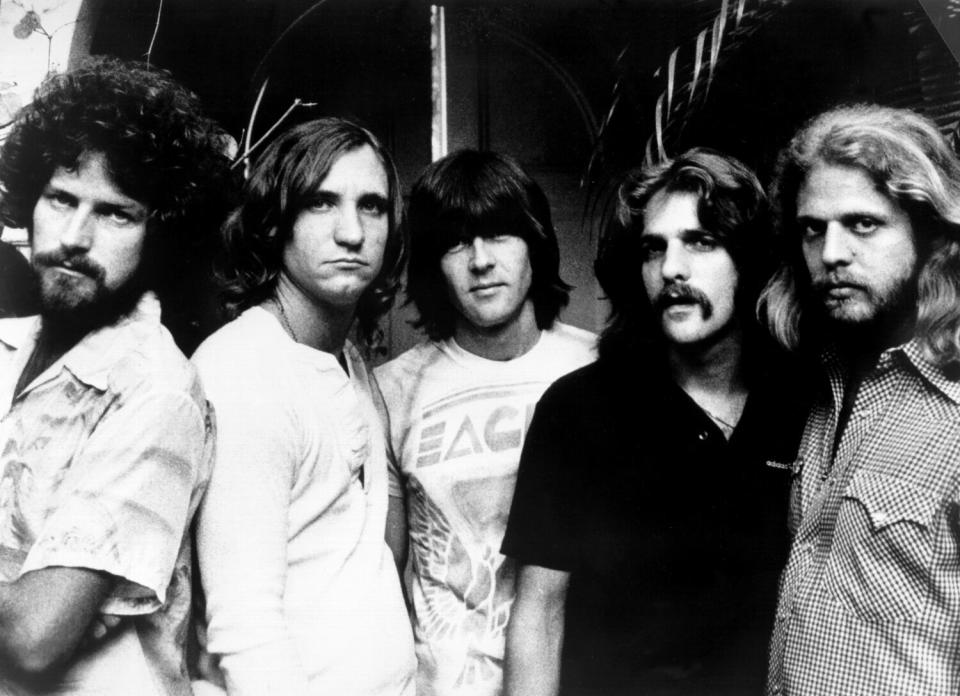Randy Meisner, founding member of L.A. rock band the Eagles, dies at 77

- Oops!Something went wrong.Please try again later.
- Oops!Something went wrong.Please try again later.
- Oops!Something went wrong.Please try again later.
- Oops!Something went wrong.Please try again later.
Randy Meisner, a founding member of the Los Angeles rock band the Eagles, who co-wrote and sang lead on the group's enduring hit “Take It to the Limit,” died on Wednesday at age 77 due to complications from chronic obstructive pulmonary disease, according to a statement released on the band's website.
“Randy was an integral part of the Eagles and instrumental in the early success of the band," the Eagles said Thursday. "His vocal range was astonishing, as is evident on his signature ballad, ‘Take It to the Limit.'"
Blessed with a sweet, soulful voice and a flair for mellow melodies, Meisner helped shape the sound of country-rock in the early 1970s, first as a member of Poco, then as the bassist for the Eagles, which he co-founded in 1971 alongside Glenn Frey, Don Henley and Bernie Leadon. Meisner was a steady presence on the group’s classic ’70s albums, contributing at least one lead vocal and co-writing credit on each record through 1976’s blockbuster “Hotel California.”
"Take It to the Limit," from the band's breakthrough 1975 LP "One of These Nights," reached No. 4 on the Billboard Hot 100.
Internal band tensions and ill health led Meisner to leave the Eagles upon the conclusion of the supporting tour for “Hotel California.”
Meisner launched a solo career in 1978, landing a soft-rock hit with “Hearts on Fire” two years later. After releasing a self-titled album in 1982, he spent the ensuing years cycling through projects with fellow country-rock survivors, including rejoining Poco for its 1989 reunion.
Apart from appearing with the band at its 1998 induction to the Rock & Roll Hall of Fame, Meisner never reunited with the Eagles.

The son of a pair of farmers, Randy Meisner was born in Scottsbluff, Neb., on March 8, 1946. After witnessing Elvis Presley on "The Ed Sullivan Show," he learned how to play guitar but soon gravitated to R&B music, which led him to pick up the bass, drawing inspiration from Motown in particular.
In his teens, he formed a band called the Drivin' Dynamics, an R&B combo that played local dances and released a Meisner-sung single called "So Fine" in 1965. A year later, the Drivin' Dynamics had broken up and Meisner relocated to Los Angeles, where he became part of the folk-rock outfit the Poor. The band released a few singles before splitting up in 1968.
Read more: My favorite Sinéad O'Connor album nearly ended her career
Meisner then teamed with Richie Furay and Jim Messina, former members of the groundbreaking Los Angeles folk-rock group Buffalo Springfield, in Poco. On the eve of the release of its debut album in 1969, Meisner left the band; his lead vocals were scrubbed but his vocal harmonies and bass playing were left in place. His replacement in Poco was Timothy B. Schmit; a decade later, Schmit would succeed Meisner in the Eagles.
After Poco, Meisner landed in Rick Nelson's pioneering country-rock outfit the Stone Canyon Band, which also featured a few of his former Poor colleagues. Aiding Nelson in his country-rock makeover, Meisner played on the cracking live album "In Concert at the Troubadour, 1969" and "Rudy the Fifth" but departed before the hit single "Garden Party" brought Nelson back to the top of the charts.
Frustrated, Meisner returned to Nebraska, where he worked at a John Deere tractor dealership while playing bars at night. Nelson encouraged him to return to L.A. Splitting his time between studio sessions and his fledgling group Goldrush, Meisner eventually was drafted by producer John Boylan to support Linda Ronstadt in a band that already featured drummer Don Henley and guitarist Glenn Frey. Adding Bernie Leadon to the lineup, the group rehearsed at the home Ronstadt shared with songwriter J.D. Souther, sessions that led the musicians to officially form the Eagles.
Signing with Asylum Records, the label launched by David Geffen, the band released its self-titled debut in 1972, which featured Meisner singing lead on his own "Take the Devil" and "Tryin." Over the next few years, the group regularly featured a Meisner lead vocal on its records, including such highlights as 1973's "Certain Kind of Fool" and 1974's "Midnight Flyer." On "Take It to the Limit," Meisner returned to his R&B roots, delivering a soaring, soulful performance that propelled the single into the Billboard Top 10 and onto radio playlists for decades to come.
The "Hotel California" album elevated the Eagles to the front ranks of musical acts, spending eight weeks at the top of the Billboard charts; it would eventually sell over 32 million copies worldwide. As the group hit a commercial peak, though, relations within the band began to fray. Months spent on the road took a particular toll on Meisner. His marriage was strained, he had grown tired of singing "Take It to the Limit" and he developed an ulcer.
All of this came to a head at a concert in Knoxville, Tenn., in 1977, where he declined to join the band in an encore. Meisner's refusal angered Frey, leading to a physical altercation. After the incident, Meisner decided to leave the band. As he recounted to People magazine in 1981, "I was just tired of the touring. It's a crazy life that you live at twice the normal speed. When it got to the point of sanity or money ... I thought I'd rather have sanity."
Read more: Musicians deal with stingy streamers and AI threats, too. So why aren't they on strike?
Per the terms of his Eagles contract, Meisner owed Elektra one more record, so he delivered a covers-laden album in 1978, saving his energy for 1980’s slick "One More Song.” That album produced a pair of hits — the Kim Carnes duet "Deep Inside My Heart" and "Hearts on Fire" — but his time in the spotlight was short-lived: He released his last solo album in 1982.
After spending nearly 15 years apart, the Eagles reunited in 1994. Meisner was not involved. The 1998 Rock & Roll Hall of Fame induction ceremony proved the last time he would share a stage with his former band, although they did extend an invitation to him to join their History of the Eagles tour in 2013. He declined, citing poor health.
Meisner's later years were plagued by health concerns, both physical and mental. His friend Jim Newton filed a request to have Meisner placed under a conservatorship in 2015, but before a ruling could be made, Meisner’s wife, Lana Rae Meisner, died after an accidental shooting at their home. Meisner filed his own request for a temporary conservatorship after her death, stating that he was "barely able to accept the sudden and tragic loss of his loving wife."
Meisner is survived by his three children with Jennifer Lee Barton, to whom he was married from 1963 to 1981: Dana Scott Meisner and twin siblings Heather Leigh Meisner and Eric Shane Meisner.
Times staff writer Christi Carras contributed to this report.
This story originally appeared in Los Angeles Times.

